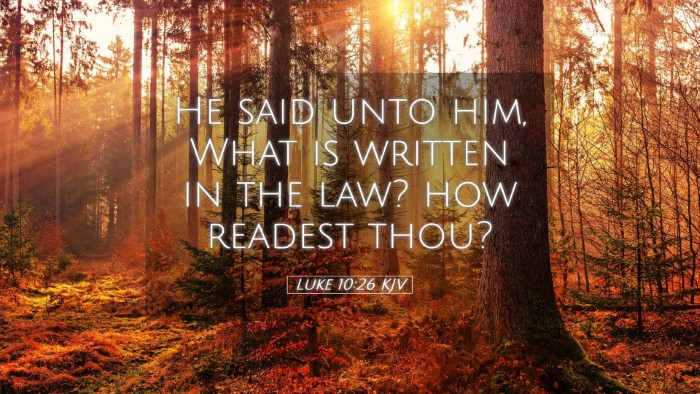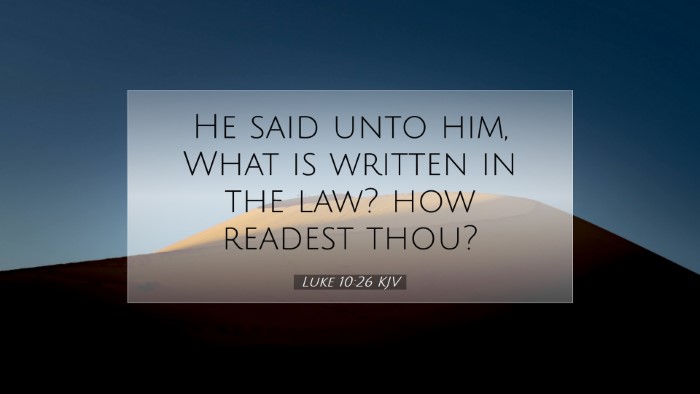Commentary on Luke 10:26
Luke 10:26 (KJV): "He said unto him, What is written in the law? how readest thou?"
Introduction
The inquiry posed by Jesus in Luke 10:26 serves as a pivotal moment, illustrating not only the profound depth of the Mosaic Law but also the necessity for personal engagement with it. When Jesus asks the lawyer about the law, He invites a self-reflection and examination of the text, revealing the core message of the Scriptures and the nature of true understanding.
Contextual Analysis
This verse is set within the larger narrative of Jesus’ interaction with a lawyer, a member of the Jewish elite, known for their knowledge of the Scriptures. The dialogue between them reflects a significant theological and cultural exchange. The lawyer tests Jesus, seeking to understand the essence of inheriting eternal life, highlighting a common pursuit among those well-versed in religious texts.
The Law's Significance
Matthew Henry's Commentary: Henry emphasizes that the law serves as a mirror, reflecting humanity's sinfulness and the need for redemption. The lawyer's question illustrates a superficial understanding—a legalistic approach devoid of the transformative power that the law was designed to invoke. He highlights that while the law is holy and just, it must be approached with humility and an awareness of one's own fallen state.
Albert Barnes' Notes: Barnes elaborates on the lawyer's role and knowledge of the law. He clarifies that by asking “how readest thou,” Jesus prompts the lawyer to articulate his understanding of the law's demands, an opportunity that requires personal engagement beyond mere academic knowledge. The challenge lies not only in understanding but in the application of that knowledge to one’s own life.
Adam Clarke's Commentary: Clarke notes that this question from Jesus is crucial as it directs the lawyer to consider his own interpretations and beliefs. Clarke stresses that the expectation is not simply a recital of the law, but a profound comprehension and an internalization that leads to action.
The Nature of the Inquiry
The phrasing of “What is written in the law?” suggests a foundational respect for Scripture, establishing the authority of the Word of God. The additional question, “how readest thou?” probes the interpretation and personal insights of the individual. This dual inquiry opens the door for deeper theological reflection.
Implications for Pastoral Ministry: For pastors, this passage emphasizes the significance of guiding congregants toward a personal reflection on Scripture. Teaching them to explore the Word not just as a historical or legal document, but as living truths that demand active response is crucial for spiritual growth.
Theological Reflections: Theologically, this inquiry reflects the necessity of Scripture engagement. The law not only outlines ethical living but reveals the character of God, showcasing themes of love, justice, and mercy that should permeate the believer's life.
The Lawyer’s Perspective
The lawyer's attempt to test Jesus implies a reliance on intellectualism rather than faith. This scenario serves as a warning against cold academic discussion that lacks personal conviction or fear of God. The temptation to view the law merely as a set of statutes can blind us to its primary purpose, which is rooted in love.
Matthew Henry's Take: Henry indicates that the lawyer's question arises from a legalistic mindset, thus contrasting it with the relational nature of the law, which focuses on the heart rather than mere obedience to rules. This challenge is essential in pastoral care, as it meets individuals in their struggles with legalism.
Call to Action
Jesus’ emphasis on how one reads the law not only challenges the lawyer but also calls all believers to introspectively assess their understanding and application of Scripture. Personal engagement with the Word motivates transformative behavior consistent with God's will.
Church Application: This passage can inspire churches to cultivate environments promoting Scripture literacy and engagement. Encouraging congregants to regularly reflect on the text, seek understanding, and apply it to their lives fosters growth in faith.
Conclusion
Luke 10:26, through the interplay between Jesus and the lawyer, exemplifies the perpetual dialogue between law and life. It urges a deeper engagement with Scripture, encouraging intellectual humility and the realization that true understanding leads to action born of love. This verse serves as a meaningful reminder for pastors, students, and theologians alike, inviting them to grapple with the essence of the law to experience its transformative power fully.


